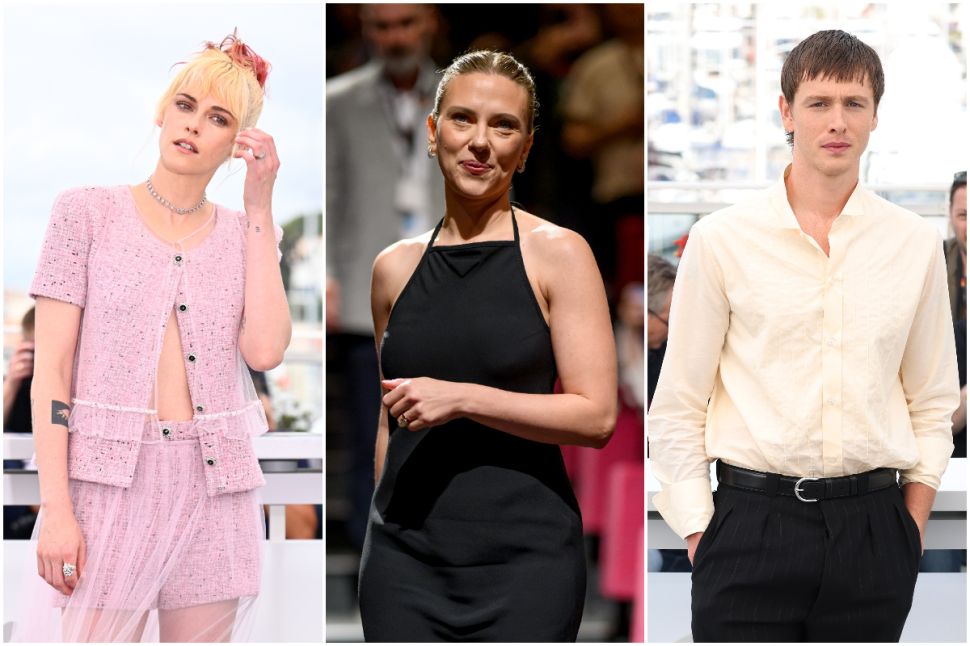“Are you fucking kidding me? Okaay,” crowed Kristen Stewart at the world premiere of The Chronology of Water, her debut as a bona-fide filmmaker after eight years of struggling to adapt Lidia Yukovich’s acclaimed memoir for the big screen. Vibrating with nervous excitement during her opening remarks, she thanked all of her collaborators with a fierce joy, ending with a dedication to the book’s author. “To Lidia Yuknavitch,” she said, “for writing and spewing the very face of fuck! Thank you for your trickle, thank you for the gush. Thank you for everything! Now let’s rip off this bandage and watch this fucking movie!”
Actors acted like directors this past week during the Cannes Film Festival, and their newfound roles were just as surprising and convincing as their acclaimed performances in front of the camera. Along with Stewart’s messy but vibrant debut, Scarlett Johannson debuted her rookie film Eleanor the Great, a touching work starring nonagenarian June Squibb that was sweetly reminiscent of quirky ’90s indie comedies. And up-and-coming Brit hottie Harris Dickinson followed up his steamy turn co-starring with Nicole Kidman in feminist sex fantasy Babygirl by getting behind the camera himself and making Urchin, a searing and startlingly mature piece of social realism.
The trio of films were not in the Official Competition at Cannes, instead appearing in the sidebar section Un Certain Regard, a less high-pressure berth that offers a more supportive showcase for new and emerging filmmakers. All three have enough commercial potential—and artistic merit—to guarantee a commercial release, if not an end-of-year awards campaign. (Sony Pictures Classics had already picked up Eleanor the Great before the festival selected it). But what’s so striking are their stylistic differences, and how they reflect each actor’s sensibilities.
True to form, The Chronology of Water is all Kristen Stewart—and might arguably be the most Kristen Stewart movie ever made: aggressively aggrieved, almost comically confrontational, hyperventilating with an in-your-face attitude that belies a self-consciously juvenile insecurity. At times, the drama delivers genuinely harrowing shocks; but interspersed are moments so over-thought and over-wrought—all lookkit-me camera angles, word-salad sound design, and flutter-cut montages—that it plays like the product of an addled film student more eager to provoke than impress.
And then there’s Imogen Poots. The wide-eyed intensity and physicality that Poots brings to her portrayal of Yuknavitch—from sexually abused teen to weathered-and-wise middle-aged mother—is revelatory. And that’s clearly due to Stewart’s clarity of vision. The way that Poots expertly delivers bursts of anger, fleeting moments of joy, wallowed self-pity and adrift soulfulness proves that an assured directorial hand is working behind the camera to modulate those mood swings.
The strongest parts of The Chronology of Water are those character reveals—especially the quieter ones, when a wrung-out Yuknavitch, after a punishing gauntlet of sex, drugs, and alcohol, slowly finds the path to redemption by writing her way out of personal oblivion. That’s when Stewart’s dogged devotion to the source material shines though in a way that signals a major filmmaking talent.
With Eleanor the Great, Johannson is taking a much less ambitious stab at directing, one that feels more like a test run than a full-throated attempt to become an auteur. It also feels like the project was inspired by her 94-year-old lead actor. “When we were shooting my film,” she said in her opening remarks at the film’s premiere, “I said, ‘if I do my job right, my dream is to see June on the Croisette in Cannes.’ And here we are! So it really is a dream come true.”
Eleanor the Great is modest in style but emotionally rich, a comic drama where Floridian retiree Eleanor, after the death of her longtime best friend, moves back to New York City to be with her overworked adult daughter and genial but detached grandson. Faced with empty days and lonely nights, she starts to deliver little white lies that eventually snowball into an avalanche of deception.
As a director, Johannson trusts Squibb to carry the film, letting the actor’s genial nature lead a light-hearted story into sadder depths. “It’s about friendship, it’s about grief, it’s about forgiveness,” said Johannson. “And I think those are all things that we can use a lot of more of these days.”
But of these three Cannes-fêted neophyte helmers, the twentysomething Dickinson is the one who delivers a real cinematic wallop with Urchin—a film he not only directed but also wrote. His look at the self-destructive patterns of a young man on the fringes of East London feels so fully formed, so confident in its plot points and performances, so strikingly restrained in its direction and so absolutely wrenching overall that the result feels preternaturally mature for such a young actor-turned-director.
Skeptics might call Urchin a knock-off of iconic kitchen-sink miserabilists like Ken Loach and Mike Leigh—British masters who have devoted their astonishing careers to chronicling society’s disenfranchised and alienated. But there’s something different enough about Dickinson’s approach that he feels more like a successor to these directors than an imitator.
Like Stewart and Johansson, Dickinson’s acting acumen certainly explains the uniformly absorbing performances—especially from lead Frank Dillane, a frustratingly charming mess too prone to self-sabotage despite his best efforts to resist the temptations of drugs and petty theft. But it’s the cumulative power of his storytelling, a slow-burn episodic script that builds confidently and irreversibly towards tragedy, that heralds Dickinson as such a promising new voice. There’s no doubt more will come from all three multi-hyphenate stars.

